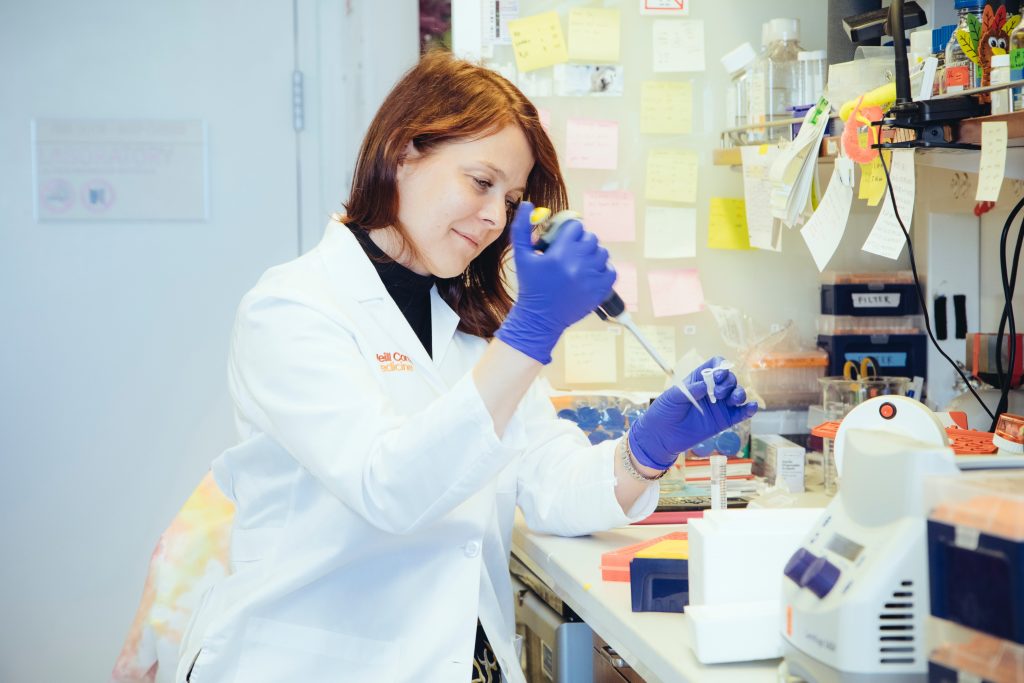Elena Piskounova, PhD ‹ Back To 2021 Winners
2021 Winners
Assistant Professor
Meyer Cancer Center
Weill Cornell Medicine
Vision
Metastasis is a unique process that is unlike any physiological process in an adult body. Metastasizing cancer cells experience a variety of different stresses as they transition through different environments. Successful metastasis requires a series of rapid adaptations in order for cells to survive and colonize distant organs. This occurs by rewiring of many cellular processes, but ultimately all of these adaptations require specific reprogramming of the cellular proteome, yet how cells bias and reprogram their proteome to produce a specific subset of proteins in response to stress remains a black box. Our goal is to determine how distinct stress cues are able to reprogram the metastatic proteome, establish its composition, and identify druggable targets specific to metastatic disease that can be ultimately translated into the clinic.
Dr. Elena Piskounova is an Assistant Professor in the Meyer Cancer Center at Weill Cornell Medicine. Originally from Russia, Dr. Piskounova received combined Bachelor’s and Master’s degrees in Molecular and Cellular Biochemistry from University of Oxford, UK. She then went on to complete her PhD training in Biological and Biomedical Sciences in the laboratory of Dr. Richard Gregory at Harvard Medical School. Dr. Piskounova did her postdoctoral work in the laboratory of Dr. Sean Morrison at UT Southwestern Medical Center, where she made several foundational discoveries about the biology of the metastatic cascade. She defined oxidative stress as a major barrier of metastasis and identified key metabolic adaptations required for the survival of metastasizing cancer cells.
Since joining WCM in 2017, Dr. Piskounova’s laboratory studies unique mechanisms of stress resistance that enable metastasis in order to identify novel therapeutic targets specific to metastatic disease.
Dr Piskounova has received several awards, including an NIH Career Transition Award, Melanoma Research Alliance Young Investigator Award, ASA Stiefel Investigative Scientist Award, as well as Scholar Awards from the Feldstein Medical Foundation, Forbeck Research Foundation and Elsa. U. Pardee Foundation.
tRNA wobble modifications as drivers of the adaptive proteome in stress resistance and metastasis

Metastasis is the deadly spread of cancer cells to vital organs. However, blood and vital organs are hostile environments and cancer cells have to adapt to different types of stress in order to survive and grow. To design effective therapies that prevent metastatic cells from taking over patients’ organs, it is essential to understand these adaptations at the molecular level. We have identified a unique regulatory mechanism by which cancer cells selectively turn on expression of proteins required for their survival. This mechanism occurs through tRNA molecules that are essential to produce proteins in an accurate and efficient manner. Chemical modification of tRNAs can enhance their ability to synthesize specific proteins under stress conditions. Because metastatic cells experience much higher levels of
stress than healthy tissue, we hypothesize that they are more dependent on modified tRNAs and subsequent production of stress-response proteins.
“The Pershing Square Sohn Prize will allow us to explore a fundamentally new avenue of research into mechanisms of rapid proteome reprogramming during the metastatic cascade. This knowledge can be extended further into other areas of cancer research, such as mechanisms of therapy resistance and immune evasion. Ultimately, we aim to identify new players that regulate metastatic spread and have high potential for translation into the clinic.”

However, the role and regulation of tRNA modifications in metastasis is completely unexplored. We propose to use a combination of cutting-edge technologies to characterize how tRNA modifications promote survival of metastasizing cancer cells and identify which stress-response proteins are produced in order to drive metastatic disease. By defining these molecular mechanisms in the context of metastasis, we will be able to identify novel targets that can be harnessed therapeutically to specifically eradicate metastatic disease.
“Innovation is the courage to follow your own curiosity, to make connections nobody else saw, and to test ideas that nobody else would.”